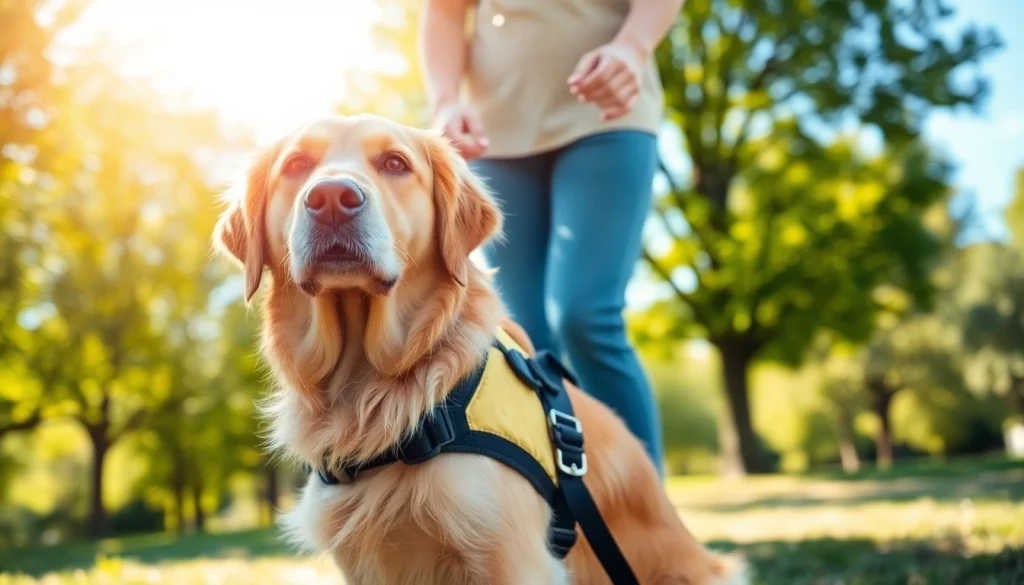Understanding the Need to Buy a Service Dog
Service dogs provide essential assistance to individuals with disabilities, enabling them to lead more independent lives. In recent years, the interest in service dogs has surged, prompting many to consider their options when looking to buy a service dog. Understanding the profound impacts these animal companions can have on daily life is the first step in recognizing their value.
What is a Service Dog?
A service dog is a specially trained animal that performs specific tasks to assist a person with a disability. These tasks can range from guiding the visually impaired to reminding individuals with memory disorders to take their medication. According to the Americans with Disabilities Act (ADA), service dogs are defined as dogs that are individually trained to do work or perform tasks for people with disabilities. Unlike therapy or emotional support animals, service dogs undergo rigorous training to ensure they can perform their duties reliably in public spaces.
Who Can Benefit from Service Dogs?
Service dogs can offer life-changing support to various individuals, including those with mobility impairments, psychiatric disorders, autism spectrum disorders, diabetes, and other medical conditions. For instance, individuals experiencing PTSD may benefit from a service dog that can help mitigate anxiety responses, while a person with mobility limitations can gain independence through a dog trained to retrieve objects and assist with balance. It’s essential for potential handlers to assess their specific needs before proceeding.
Common Tasks Performed by Service Dogs
Service dogs can perform an array of tasks that significantly enhance their handler’s quality of life. Some common duties include:
- Guiding: Helping visually impaired individuals navigate their environments safely.
- Retrieving: Picking up objects that the handler drops or cannot reach.
- Alerting: Waking a person from nightmares or alerting them to medical emergencies, such as a seizure.
- Stabilizing: Providing support for individuals with mobility challenges.
- Interrupting: Disrupting harmful behaviors seen in conditions like autism or anxiety disorders.
Factors to Consider Before You Buy a Service Dog
Assess Your Needs and Lifestyle
Before deciding to buy a service dog, it’s vital to conduct a thorough assessment of your personal needs and lifestyle. Factors such as your daily activities, living situation, and the specific tasks you require assistance with will influence the type of service dog best suited for you. For example, if you lead an active lifestyle, choosing a breed that can keep pace and thrive in dynamic environments is essential.
Understanding the Cost of a Service Dog
The financial implications of acquiring a service dog can be substantial. Costs vary based on the dog’s breed, training, and the organization providing the services. On average, the cost of a fully trained service dog can range from $15,000 to $30,000. Additionally, there are ongoing expenses, including vet visits, training refreshers, and daily care. It’s crucial to budget for these costs and investigate funding options or assistance programs that may be available to help alleviate the financial burden.
Choosing the Right Breed for Your Requirements
The breed of your service dog can significantly affect their ability to perform necessary tasks. While any dog breed can potentially be trained as a service dog, some breeds have temperamental or physical characteristics that make them more suitable. For example:
- Golden Retrievers: Known for their friendly nature and intelligence, they excel in guiding and assistance work.
- Labrador Retrievers: Their versatility makes them the most common choice for service dog work.
- Poodles: Highly trainable and hypoallergenic, making them ideal for those with allergies.
When considering a breed, think about the physical requirements of your tasks and your environment to ensure you choose a dog that matches your lifestyle.
The Process of Buying a Service Dog
Researching Reputable Organizations
Once you’ve assessed your needs, the next step involves researching organizations that specialize in training and placing service dogs. Look for organizations that are accredited by reputable bodies, such as Assistance Dogs International (ADI), to ensure the quality and reliability of the training provided. Check reviews, testimonials, and success stories from other service dog handlers to gauge the organization’s effectiveness and reputation.
Application and Approval Procedures
After selecting an organization, you will typically need to fill out an application detailing your needs, lifestyle, and the tasks you expect your service dog to perform. The organization may conduct interviews, home assessments, or require medical documentation to determine eligibility. Remember that this can be a competitive process, and waiting times for approval and placements can vary widely, ranging from a few months to over a year.
Training and Certification Overview
Post-approval, the training phase begins, which is essential to ensure that your service dog is fully prepared to assist you. The training may involve basic commands, task-specific training, public access training, and socialization experiences. Certification often follows successful completion of training, which usually involves demonstrating the dog’s ability to perform required tasks in various scenarios. Understanding the significance of this process cannot be overstated as it ensures that the dog is not only trained but also calm and well-behaved in public settings.
Best Practices After You Buy a Service Dog
Establishing a Strong Bond with Your Service Dog
Building a trusting and nurturing relationship with your service dog is paramount. The bond between handler and dog can enhance communication, cooperation, and effectiveness in public settings. Spend quality time engaging in activities that foster this relationship, including playing, training, and relaxing together. It’s also vital to recognize and respect your dog’s needs, ensuring they feel safe and comfortable in their environment.
Ongoing Training and Socialization
Service dog training doesn’t end once you bring your dog home. Ongoing training and socialization are crucial to maintain their skills and adapt to new experiences. Regularly practice commands and tasks, introduce your dog to varied environments, and engage them in activities that require different levels of focus. Continuous training not only keeps their skills sharp but also helps to build confidence and resilience in various situations.
Maintaining Health and Well-Being
The health and well-being of your service dog are fundamental to their ability to assist you effectively. Regular veterinary check-ups, proper nutrition, and exercise are essential components of care. Keeping your dog healthy also includes addressing any behavioral or psychological issues that may arise, from anxiety in social settings to physical ailments from wear and tear. Investing in quality veterinary care, training resources, and engaging activities will significantly enhance your dog’s quality of life.
Resources and Support for Service Dog Owners
Online Communities and Support Groups
Connecting with other service dog owners can offer invaluable support and shared experiences. Online communities and support groups allow you to exchange information, seek advice, and share successes. These platforms foster a sense of belonging and can provide emotional support, especially when navigating the legal and administrative aspects of service dog ownership.
Educational Materials and Workshops
Numerous educational resources are available to help service dog handlers understand their rights and responsibilities. Workshops, webinars, and handy guides offer information on best practices for training, health care, and legal rights regarding service dogs. Being well-informed enhances your ability to advocate for yourself and your dog in public spaces while promoting positive interactions with others.
Legislation and Rights for Service Dog Owners
Understanding the legal rights associated with service dogs is crucial for both you and your dog. The ADA protects service dog owners from discrimination in public places, granting them access that is otherwise restricted to pets or emotional support animals. Familiarize yourself with the legal definitions and provisions in your state or region to effectively advocate for your rights and those of your service dog.



